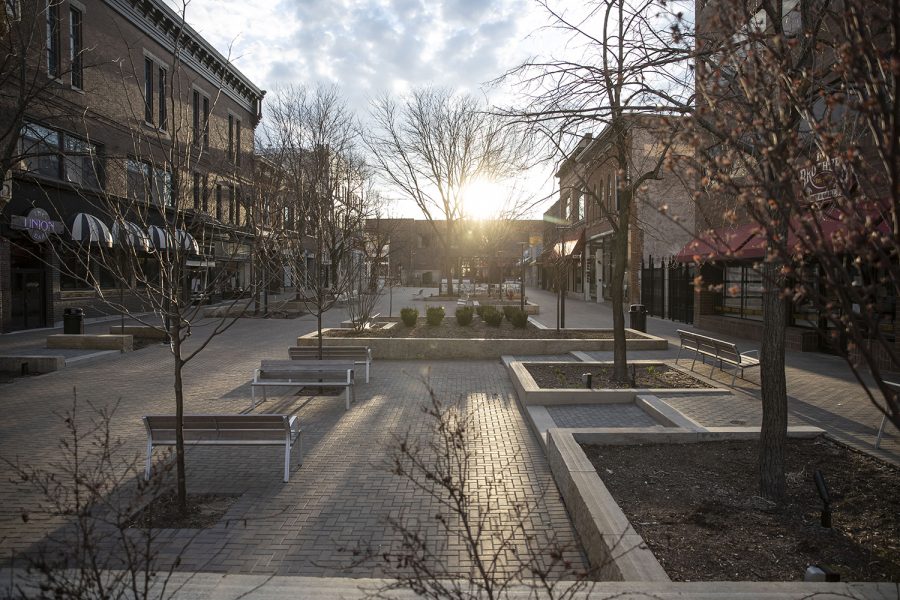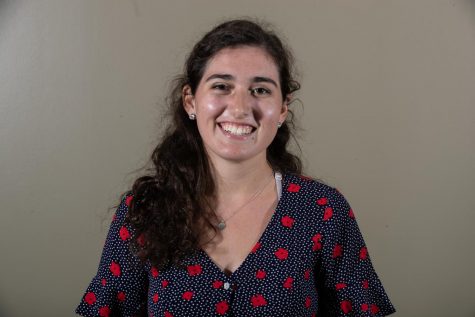Opinion | Focus on the town, not the nation
We as a nation have been so caught up in what’s been happening nationally that we have neglected the stories going on all around us.
The Ped Mall is seen on Saturday, April 4, 2020. Downtown was quiet during the first weekend after spring break as classes have been moved online and the bars closed due to coronavirus.
December 2, 2020
The average person does not need to read Pulitzer Prize winning works to experience a story worthy of one — they are already living such a story. We just don’t acknowledge it.
The Daily Iowan’s recent community chat included a columnist who would agree — Courtney Crowder. One of Crowder’s pieces, the Iowa Mourns project, tells the stories of Iowans whose family members died from COVID-19.
Democrats and Republicans argue about and accuse each other of handling the pandemic poorly. The Iowa Mourns Project puts politics aside and does what journalists should — tell the stories of people this event has impacted.
A human focus adds value and takes away controversy from a story.
To the people who lost loved ones as a result of COVID-19, it is so much more than just a political issue. Their stories deserve to be told.
In another story Crowder worked on, she and a source who was raped talked on the phone for hours before setting up an actual interview. They formed a lifelong friendship, and connection. Ordinary people — not celebrities or politicians — teach media consumers and producers kindness, empathy, and compassion.
A massive case that garnered national attention was the Brock Turner rape case, in which he was convicted of sexually assaulting Chanel Miller. The coverage of the events regarding the case focused largely on Turner’s perspective, leaving Miller as just an “unconscious” and “drunk” victim. While there are changes occurring in the news to address the over-representation of the perpetrator’s viewpoint, there are still greater developments that can and should be made.
According to a study done by Kallie Carlyle et. al., news coverage of intimate partner violence can change public perceptions of sexual violence and discussions surrounding public policy regarding it.
While the study does not discuss other topics, I would bet that the same goes for a myriad of issues — homelessness, mental illness, disabilities, along with many, many others.
Anyone can access Trump’s voter fraud tweets, but America will not hear the stories of everyday people unless the media tells them.
Working-class people have stories which can be so much more impactful and relatable than those of politicians and celebrities. While celebrities and politicians can and do struggle with severe issues, their experiences can be so far removed from the everyday experience of the average American that their stories ring hollow.
The community chat reminded me of who I am as a writer. I would rather interview people with communication disorders than politicians. I feel more comfortable talking to people with than without mental illnesses.
Apolitical journalists are just as needed and impactful as political ones. I love getting to know sources and hearing stories which are personal and hard to talk about. As Crowder mentioned, talking about traumatic experiences helps survivors mentally.
I want to show others with congenital heart defects they don’t decrease the strength of hearts and genetic diseases are not destiny. I want to make others with physical disabilities feel like marathon winners.
I want others, with and without medical conditions, to experience one of the best feelings — realizing your story matters.
The breadth of celebrity gossip and minor political drama would not be made into stories if there was not a market for it.
We need to applaud and support writers such as Crowder for her work. If not, we’ll be too focused on the coasts to notice what goes on in our own backyards.
Columns reflect the opinions of the authors and are not necessarily those of the Editorial Board, The Daily Iowan, or other organizations in which the author may be involved.















